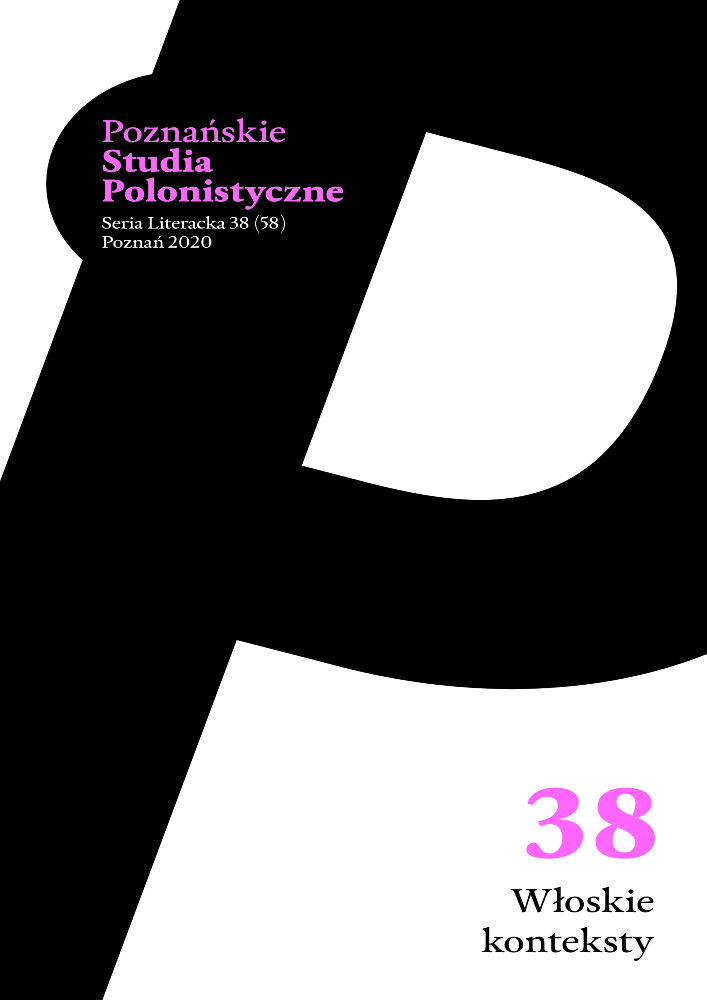Abstract
The aim of the article is to draw attention to the value of a translation series as an interpretation tool. Its subject is the translation series consisting of five Italian translations of Julian Tuwim’s Rzecz Czarnoleska (The Czarnolas affair). The key to the analysis is the double reference to Polish Renaissance and Romanticism by allusions to Jan Kochanowski and Cyprian Kamil Norwid. The linguistic and cultural challenges have been overcome by the translators by means of different compensation strategies singled out and commented on in the article.
References
Balcerzan Edward (1968), Poetyka przekładu artystycznego, „Nurt”, nr 8, s. 23-26.
Barańczak Stanisław (1990), Mały, lecz maksymalistyczny Manifest translatologiczny albo: Tłumaczenie się z tego, że tłumaczy się wiersze również w celu wytłumaczenia innym tłumaczom, iż dla większości tłumaczeń wierszy nie ma wytłumaczenia, „Teksty Drugie”, nr 3, s. 7-66.
Ceccherelli Andrea (2007), „Che vuoi da noi, Signore...” di Jan Kochanowski: prova ragionata di traduzione, w: Slavica et alia. Per Anton Maria Raffo, red. Andrea Ceccherelli, Cristiano Diddi, Danilo Gheno, Editrice „La Giuntina”, Firenze, s. 233-240.
Ceccherelli Andrea (2020), Porządek świata w harmonijnym hymnie „Czego chcesz od nas, Panie” Jana Kochanowskiego w: Światowa historia literatury polskiej. Interpretacje, red. Magdalena Popiel, Tomasz Bilczewski, Stanley Bill, Wydawnictwo Uniwersytetu Jagiellońskiego, Kraków.
Eco Umberto (2003), Dire quasi la stessa cosa, Bompiani, Milano.
Elwert W. Theodor (1991), Versificazione italiana dalle origini ai giorni nostri, Le Monnier, Firenze.
Fik Ignacy (1930), Uwagi nad językiem Cyprjana Norwida, Kasa im. Mianowskiego, Kraków.
Norwid Cyprian Kamil (1984), Moja piosnka (I), w: tegoż, Pisma wierszem i prozą, PIW, Warszawa.
Ortega y Gasset José (1964), Obras Completas: Tomo V 1933-1941, Revista de Occidente, Madrid, s. 450.
Urbańczyk Stanisław, red. (1977-1981), Słownik staropolski, t. 8: Rozpróchnieć–Szyszki, Ossolineum, Wrocław–Warszawa–Kraków, [dostęp: 29 września 2020], https://pjs.ijp.pan.pl/Sstp/t8.pdf.
Sawicka Jadwiga (1975), „Filozofia słowa” Juliana Tuwima, Ossolineum, Wrocław–Warszawa–Kraków.
Venuti Lawrence (1995), The Translator’s Invisibility, Routledge, New York.
Vocabolàrio (2020), [avvolgere], Treccani, [dostęp: 6 października 2020], https://www.treccani.it/vocabolario/vocabolario/.
Wojtasiewicz Olgierd (1957), Wstęp do teorii tłumaczenia, Ossolineum, Warszawa.
License
Authors
Authors of texts accepted for publication in „Poznańskie Studia Polonistyczne. Seria Literacka” are required to complete, sign and return to the editor's office the Agreement for granting a royalty-free license to works with a commitment to grant a CC sub-license.
Under the agreement, the authors of texts published in „Poznańskie Studia Polonistyczne. Seria Literacka” grant the Adam Mickiewicz University in Poznań a non-exclusive, royalty-free license and authorize the use of Attribution-NoDerivatives 4.0 International (CC BY-ND 4.0)Creative Commons sub-license.
The authors retain the right to continue the free disposal of the work.
Users
Interested Internet users are entitled to use works published in „Poznańskie Studia Polonistyczne. Seria Literacka” since 2016, for non-commercial purposes only, under the following conditions:
- attribution - obligation to provide, together with the distributed work, information about the authorship, title, source (link to the original work, DOI) and the license itself.
- no derivatives - the work must be preserved in its original form, without the author's consent it is not possible to distribute the modified work, such as translations, publications, etc.
Copyrights are reserved for all texts published before 2016.
Miscellaneous
Adam Mickiewicz University in Poznań retains the right to magazines as a whole (layout, graphic form, title, cover design, logo etc.).
